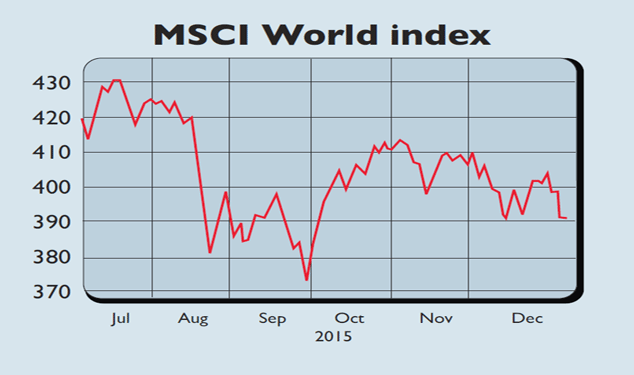Markets' New Year resolve proves weak
Markets have started the year with a New Year hangover. By mid-week, the MSCI World index – tracking both developed and emerging markets – had lost 2.5% and hit a three-month low.

Get the latest financial news, insights and expert analysis from our award-winning MoneyWeek team, to help you understand what really matters when it comes to your finances.
You are now subscribed
Your newsletter sign-up was successful
Want to add more newsletters?

Twice daily
MoneyWeek
Get the latest financial news, insights and expert analysis from our award-winning MoneyWeek team, to help you understand what really matters when it comes to your finances.

Four times a week
Look After My Bills
Sign up to our free money-saving newsletter, filled with the latest news and expert advice to help you find the best tips and deals for managing your bills. Start saving today!

Talk about a New Year hangover. By mid-week, the MSCI World index tracking both developed and emerging markets had lost 2.5% and hit a three-month low. Monday saw several markets suffer their worst first trading day in years; the pan-European DJ Stoxx 600 index had its worst on record.
Brent crude futures have slumped to under $35 a barrel, a 12-year low. Emerging-market stocks fell to a new post-crisis low and emerging-market currencies followed. North Korea's claim to have tested a hydrogen bomb unsettled investors already worried about mounting tension between Iran and Saudi Arabia.
What the commentators said
China's weakness has dragged down commodities too, which means that "the turn of the calendar will not alleviate pressure" on raw materials exporters and emerging markets in general, said Brown Brothers Harriman. It hardly helps that investors have been turning their back on the sector in anticipation of higher interest rates in America, which always make riskier assets less appealing.
MoneyWeek
Subscribe to MoneyWeek today and get your first six magazine issues absolutely FREE

Sign up to Money Morning
Don't miss the latest investment and personal finances news, market analysis, plus money-saving tips with our free twice-daily newsletter
Don't miss the latest investment and personal finances news, market analysis, plus money-saving tips with our free twice-daily newsletter
Meanwhile, oil's initial uptick amid the Iran/Saudi row has rapidly dissipated as the focus returns to the huge glut in the oil market. The market is interpreting the tension as bearish "as it means [there] is even less chance of an Opec agreement", said PVM's Tamas Varga. Absent an Opec consensus to stop pumping at full throttle, Saudi is not going to cut back and thus help Iran gain market share.
Get the latest financial news, insights and expert analysis from our award-winning MoneyWeek team, to help you understand what really matters when it comes to your finances.

-
 Early signs of the AI apocalypse?
Early signs of the AI apocalypse?Uncertainty is rife as investors question what the impact of AI will be.
-
 Reach for the stars to boost Britain's space industry
Reach for the stars to boost Britain's space industryopinion We can’t afford to neglect Britain's space industry. Unfortunately, the government is taking completely the wrong approach, says Matthew Lynn